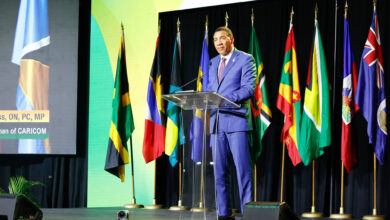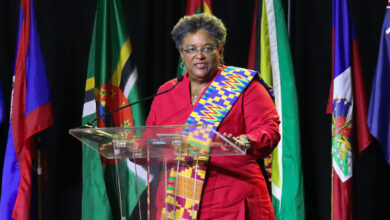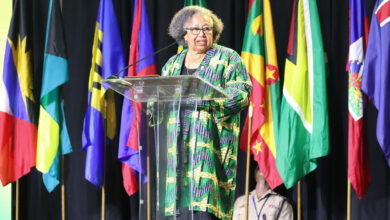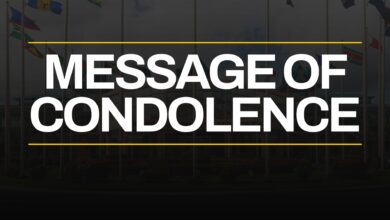Distinguished Secretary General
Colleague Ministers
Excellencies and other representatives of the Diplomatic Corps
Distinguished Guests
Members of the Media
It is an honour and a privilege to welcome colleague Ministers of Foreign Affairs and their delegations to this Eighth Meeting of the Council for Foreign and Community Relations (COFCOR). On behalf of the Prime Minister, the Government and people of the Commonwealth of The Bahamas, we are honoured to host this important meeting in Freeport, Grand Bahama.
In this regard, I wish to extend a particular welcome to the recently appointed Minister of Foreign Affairs of Dominica, the Hon. Charles Savarin, who only last month, assumed office and therefore joins us in that capacity for the first time this week.
The Government of The Bahamas took the decision to host this important meeting in Grand Bahama in part as a means of engaging the people of this island in the work of foreign affairs but also to demonstrate the will of the people on this island in their recovery from two devastating hurricanes. The hurricanes showed us all in the region how we are one. The Caribbean Community was instrumental in the recovery of Grand Bahama. In fact the first on the scene following the first storm was the Caribbean Disaster Relief Agency (CDERA). Help in restoring electricity came from CARILEC that organised electrical workers to come here to help. Prime Minister Patrick Manning of Trinidad and Tobago and the Chief Minister of the Turks and Caicos Michael Missick visited the islands several weeks following the devastation of Hurricanes Jeanne and Frances, both contributing to the hurricane relief effort. There was a true spirit of support from all our regional neighbours. So in welcoming you, we also say thank you, and we hope that you see that Freeport is back. This comradeship demonstrates the region's commitment to The Bahamas.
The Bahamas joined CARICOM in July 1983 and continues to demonstrate commitment to the ideals of the Caribbean Community. Prior to that, we were a contributing member of the University of the West Indies (UWI), now an associated body of CARICOM.
The Bahamas also signed the Grand Anse Declaration in 1989, which led to the revised Revised Treaty of Chaguaramas which treaty became available for signature in Nassau in July 2001, when The Bahamas hosted the Heads of Government meeting of CARICOM. Our meeting today and our further engagement in and with CARICOM in 2005 is a continuation of a 22-year history of formal engagement in the regional movement.
Colleagues, we gather to convene this Eighth meeting of the COFCOR against the backdrop of a changing global landscape of international political, economic and social challenges, which encompasses our neighbours in Port-au-Prince and Caracas and reaches into Darfur and Baghdad.
There is much that is happening around us that will impact our lives and the lives of our people in the years to come. There is much that would require from us the definition and articulation of common, or, at the very least, co-ordinated responses. As a Community of States, we must be seen to act as a “community” in the true sense of the word. It is important for the Community to work together and stick together.
We need go no further than our recent experience in the Organisation of American States (OAS) to find a case in point. The unified position we adopted in supporting one candidate for the OAS Secretary General gives proof to the fact that CARICOM as a Region remains united and is well positioned for strategic influence in the matters of importance to the Region. The present discussion at the United Nations on Security Council Reform has opened a window for us to make others recognise the special challenges and vulnerabilities facing Small Island Developing States and to promote the well-being of our peoples.
Closer to home, we as a Region must tap into the available resources of our Hemispheric partners with a view to strengthening relations and establishing greater co-operation with key players in the global community.
We should also seek to strengthen our relations with our Northern hemispheric partners; that is, where possible, improving our particular friendship with Canada and seeking a resumption of regular exchanges with the United States of America. Of the many regions of the world to which our foreign policy must give priority, none however, holds more relevance and importance to us than this hemisphere and the countries comprising it.
Further afield, we should also seek to develop and strengthen relations with our African friends and with selected Asian countries. The Conference on Caribbean-Africa Diaspora held in Jamaica in March earlier this year verified to us the similarities and the ties that we share with Africa and provided an impetus for us to connect ourselves further with this region to our mutual benefit.
In this connection, we should use those mechanisms that we have at our disposal such as the Joint Commissions and participation in the same regional groupings such as the Group of 77 and China at the United Nations and the ACP in Brussels with a view to ensuring that there is strategic interface with these countries that is not only developed but also used to our advantage.
Over the next few months we will be participating in a number of high level meetings underscored with the convening of the several Summits of Heads of State and/or Government among which are the Second South Summit in Doha, Qatar, the Fourth Association of Caribbean States Summit in Panama, the Fourth Summit of the Americas in Argentina, the High-Level Meeting planned for September at the United Nations and the Commonwealth Heads of Government Meeting in Malta.
We should maximise our participation in these high level consultations to present the Region's views on issues that are critical to its socio-economic development. Issues that include human resource development, governance and democracy, South-South and North-South relations all within the context of the phenomenon of a level of global interconnectedness of trade, capital flows and advances in technology that have a significant impact on the domestic economies as well as multinational relations. And we must do this while calling for an economic system that is equitable, transparent, inclusive and broad-based.
I make special reference to the two issues of particular priority to the Meeting; security and the Caribbean Sea. We are all cognizant of the fact that the issue of the Reform of the Security Council is also important. Aspirants for permanent membership of that body have not failed in presenting to us their views on why the Security Council should be expanded. There are those who urge that the expansion should provide a greater opportunity for more of the developing countries, especially small island developing states. This is a particularly interesting idea for CARICOM states.
While we welcome the opportunity to engage in dialogue with United Kingdom, during the Caribbean-UK Forum on matters pertaining to the internal security of our countries and the deleterious effects of drug trafficking and the illicit trafficking of small arms, we should also seek opportunities to inform the international community about the special dimensions of security in the region including the larger issues of poverty, health care and education.
Regarding the Caribbean Sea, CARICOM must remain consistent and become more vigilant regarding its concerns on the transhipment of nuclear waste through the Caribbean, specifically in the halls of the United Nations. Not only is the Caribbean Sea the natural home of the majority of countries of our Community of States, but it also the basis of our livelihoods. We say an unqualified no to nuclear wastes through the seas of this Region from Bermuda, through The Bahamas all the way to Suriname.
Colleague Ministers, may I venture to say that perhaps over the next two days we will find that devising ways for positioning CARICOM firmly within the international landscape will be our most critical task as we address regional, hemispheric and global issues and tighten our preparations and capacities for intervention in the arenas of international engagement. In my view, however, there can be no more compelling issue for us than the return of Haiti to the Councils of CARICOM. It is essential that there be free and fair elections in Haiti, and that all citizens of Haiti be allowed to participate in its political processes free from arbitrary arrests or from the concerns of political violence and discrimination.
In closing, I wish to convey my personal thanks to Foreign Minister of Barbados, Dame Billie Miller, for her excellent stewardship of the COFCOR over the last year. I ask you to join me in acknowledging her dynamism and commitment. With your help and that of the Secretariat, I look forward to continuing the work carried out in her tenure.
I thank you.




